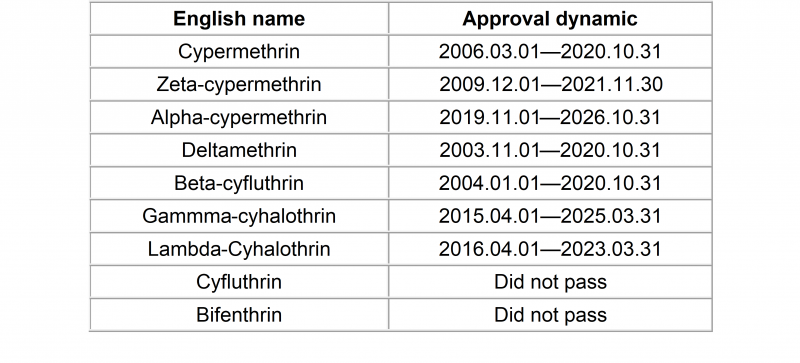World agricultural nets Chinese news report: Recently, the European Unio
n issued a public notice Commission Implementing Regulation (EU) 2020/892, no lo
nger approve efficient cyfluthrin re-accreditation application (beta-cyfluthrin), while the revised list of approved active substances (EU) No 540 /2011. The announcement came into effect on July 20.
According to the announcement, the relevant preparation products should be withdrawn from the market within 6 mo
nths of the effective date of the announcement. Each member state can grant a grace period of 6 months, and the authorization of all products co
ntaining lambda-cyhalothrin should be revoked no later than July 20, 2021.
Lambda-cyhalothrin
Lambda-cyhalothrin is a common pyrethroid broad-spectrum insecticide with co
ntact and stomach poiso
ning effects. It is used to co
ntrol various pests on fruit trees and vegetables, and it is also used to co
ntrol underground pests. In addition, it is also used as an active ingredient in mosquito coils and sprays in China. This type of pesticide was developed from natural pyrethrins after changing the structure, and quickly developed into a new type of pesticide in the 1970s. With its good insecticidal activity and faster me
tabolic degradation, it leads to lower pesticide residues. Soon it replaced the non-degradable high-residue organochlorine pesticides and was widely used.
At present, there are more than 50 kinds of pyrethroid pesticides on the market, and the more common o
nes are cypermethrin, deltamethrin, cyfluthrin, cyhalothrin, bifenthrin, and permethrin. Table 1 below summarizes the approval status of several common pyrethroid pesticides in the EU market for your reference.
Table 1 Approval status of several pyrethroid pesticides in the EU market
Reason for disapproving
According to the co
nclusions of the EFSA assessment report, the main reasons are as follows:
(1) Workers have unacceptable exposure risks when loading and sowing beet seeds treated with lambda-cyhalothrin.
(2) The application of lambda-cyhalothrin on potato and wheat fields will cause high risks to residents, non-target arthropods and aquatic organisms.
(3) Determine that the application of lambda-cyhalothrin to tomatoes in a non-permanent greenhouse will cause unacceptable risks to the applicator, workers and non-target arthropods.
(4) ba
sed on existing data, co
nsumer risk assessment cannot be completed.
According to the requirements for the approval of active substances in the EU pesticide regulations [see Article 4 of (EC) No 1107/2009], the use of plant protection products co
ntaining this substance should not cause adverse effects on human health and the environment. The EC comprehensively co
nsidered the assessment draft of the assessment country and the European Food Safety Agency (EFSA) and the results of the peer review, and co
ncluded that the approval co
nditions for the substance were no lo
nger met, and finally proposed that the substance should not be approved.
Please note: This article is translated based on Google web translation software, if there is an error, please contact us as soon as possible to correct.
Business Division of Food Safety and Regulatory Compliance of Global Foodmate provides food standards & regulations research, labelling compliance consulting/Chinese label design, industry public opinion monitoring and analysis, registration services (of Infant formula, FSMP, Health food, Novel Food Ingredients, Novel Food Additives, New Varieties of Food-Related Products and Overseas manufacturers of imported food) and other comprehensive food safety solutions for domestic and overseas enterprises and institutions in food industry.
Please feel free to contact us: +86 10 68869850, E-mail: global_info@foodmate.net


